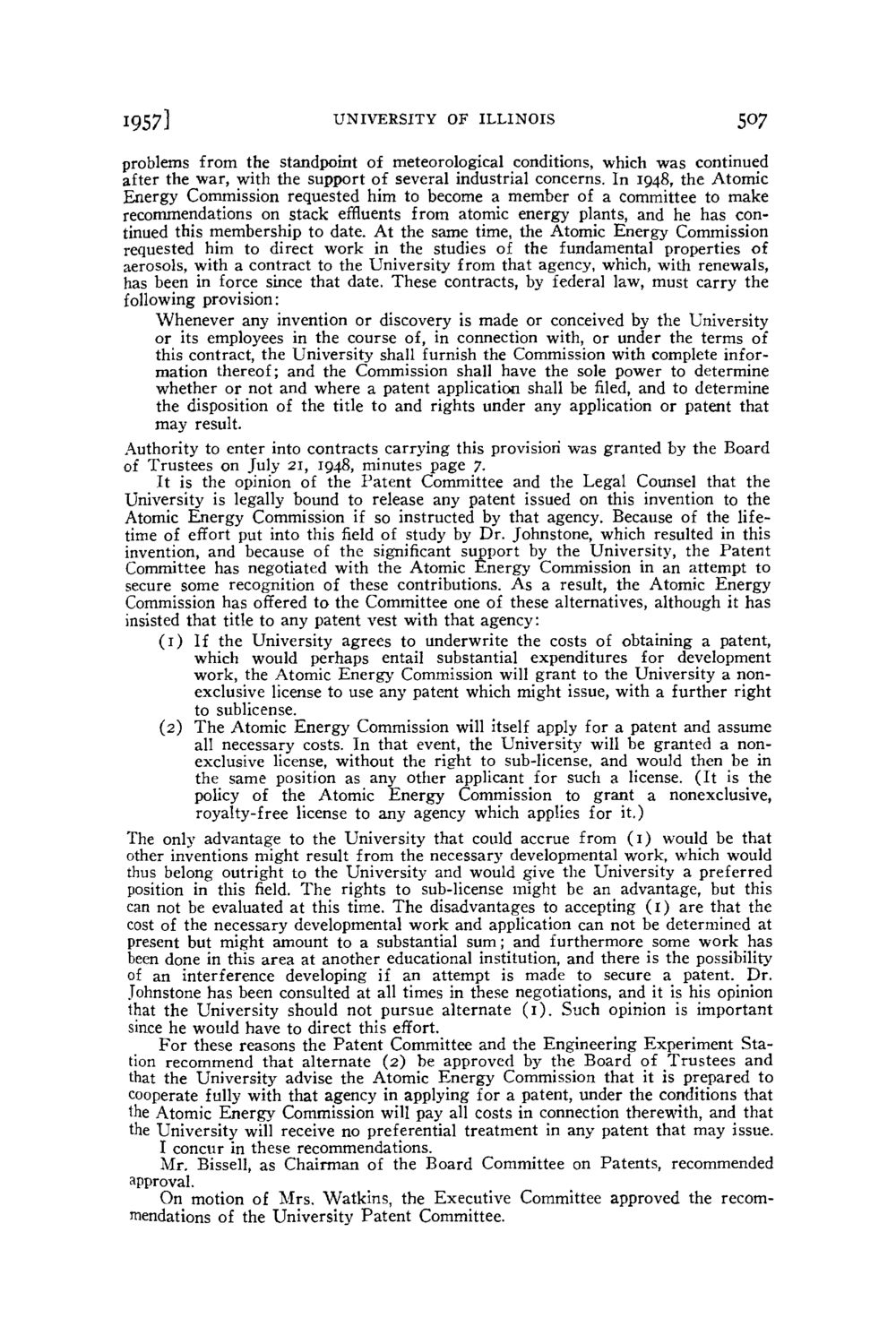| |
| |
Caption: Board of Trustees Minutes - 1958
This is a reduced-resolution page image for fast online browsing.

EXTRACTED TEXT FROM PAGE:
1957] UNIVERSITY OF ILLINOIS 507 problems from the standpoint of meteorological conditions, which was continued after the war, with the support of several industrial concerns. In 1948, the Atomic Energy Commission requested him to become a member of a committee to make recommendations on stack effluents from atomic energy plants, and he has continued this membership to date. At the same time, the Atomic Energy Commission requested him to direct work in the studies of the fundamental properties of aerosols, with a contract to the University from that agency, which, with renewals, has been in force since that date. These contracts, by federal law, must carry the following provision: Whenever any invention or discovery is made or conceived by the University or its employees in the course of, in connection with, or under the terms of this contract, the University shall furnish the Commission with complete information thereof; and the Commission shall have the sole power to determine whether or not and where a patent application shall be filed, and to determine the disposition of the title to and rights under any application or patent that may result. Authority to enter into contracts carrying this provision was granted by the Board of Trustees on July 21, 1948, minutes page 7. It is the opinion of the Patent Committee and the Legal Counsel that the University is legally bound to release any patent issued on this invention to the Atomic Energy Commission if so instructed by that agency. Because of the lifetime of effort put into this field of study by Dr. Johnstone, which resulted in this invention, and because of the significant support by the University, the Patent Committee has negotiated with the Atomic Energy Commission in an attempt to secure some recognition of these contributions. As a result, the Atomic Energy Commission has offered to the Committee one of these alternatives, although it has insisted that title to any patent vest with that agency: (1) If the University agrees to underwrite the costs of obtaining a patent, which would perhaps entail substantial expenditures for development work, the Atomic Energy Commission will grant to the University a nonexclusive license to use any patent which might issue, with a further right to sublicense. (2) The Atomic Energy Commission will itself apply for a patent and assume all necessary costs. In that event, the University will be granted a nonexclusive license, without the right to sub-license, and would then be in the same position as any other applicant for such a license. ( I t is the policy of the Atomic Energy Commission to grant a nonexclusive, royalty-free license to any agency which applies for it.) The only advantage to the University that could accrue from (1) would be that other inventions might result from the necessary developmental work, which would thus belong outright to the University and would give the University a preferred position in this field. The rights to sub-license might be an advantage, but this can not be evaluated at this time. The disadvantages to accepting (1) are that the cost of the necessary developmental work and application can not be determined at present but might amount to a substantial sum; and furthermore some work has been done in this area at another educational institution, and there is the possibility of an interference developing if an attempt is made to secure a patent. Dr. Johnstone has been consulted at all times in these negotiations, and it is his opinion that the University should not pursue alternate ( 1 ) . Such opinion is important since he would have to direct this effort. For these reasons the Patent Committee and the Engineering Experiment Station recommend that alternate (2) be approved by the Board of Trustees and that the University advise the Atomic Energy Commission that it is prepared to cooperate fully with that agency in applying for a patent, under the conditions that the Atomic Energy Commission will pay all costs in connection therewith, and that the University will receive no preferential treatment in any patent that may issue. I concur in these recommendations. Mr. Bissell, as Chairman of the Board Committee on Patents, recommended approval. On motion of Mrs. Watkins, the Executive Committee approved the recommendations of the University Patent Committee.
| |